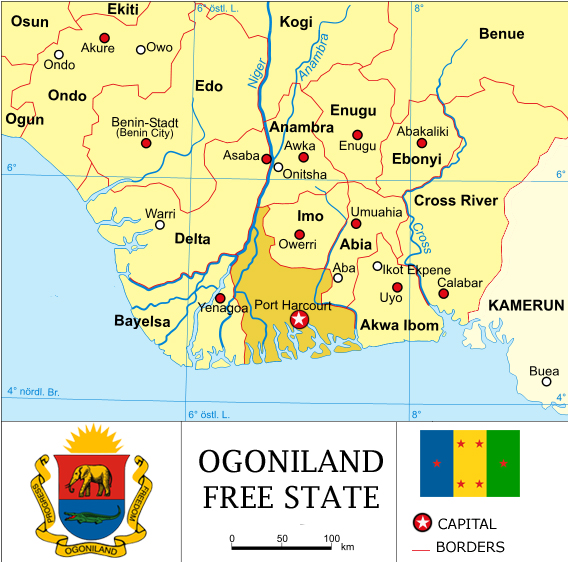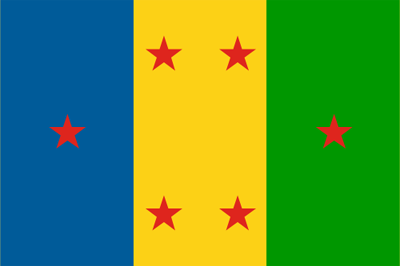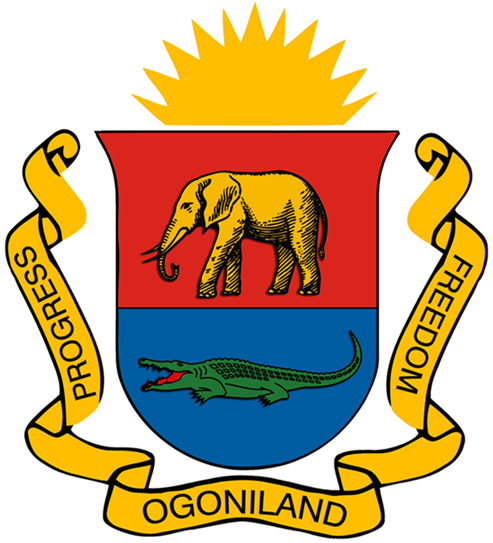
Ogoniland Declares Self-Government
2 August 2012
Jubilations are continuing
throughout Ogoniland after the Ogoni people in southern Nigeria, today,
Thursday, 2nd of August declared political autonomy.
In a live
broadcast on a newly established radio station: Voice of Ogoni, MOSOP
President/Spokesman, Dr. Goodluck Diigbo vowed that:“By this declaration of
political autonomy, we, the Ogoni people are determined to enforce the United
Nations Declaration on Rights of Indigenous Peoples, without fear or
retreat,” Diigbo said.
Diigbo affirmed that self-government within
Nigeria will secure for the Ogoni people, their indigenous rights, enable
them to meet their needs and interests and finally end internal
colonialism.
Diigbo said self-government became urgent recognizing the
need to arrive at a consensus to collectively review the disputed UNEP
Ogoniland Oil Assessment report, because any dialogue must be with the
genuinely elected representatives of the people expected to enforce
indigenous rights without dictation.
In the broadcast, Diigbo further
underscored the reason for the urgency of self-government for Ogoni:
“Concerned that in the absence of a responsive government that the indigenous
people of Ogoni will continue to suffer from historic
injustices.”
Diigbo stated: “In order to make indigenous rights
practicable in Ogoni, we have through a very transparent electoral college
process, beginning with community by community elections, set up 272 village
councils, while the village councils in turn elected representatives for 33
district councils and the district representatives went on to elect
representatives to serve at the center as custodians of customs and
traditions, otherwise called lawmakers.”
“The law makers in turn
elected the executive arm of the Ogoni Central Indigenous Authority (OCIA)
with checks and balances inbuilt to ensure corruption-free, effective,
efficient and answerable system of grassroots self-government instead of the
old, corrupt and mismanaged local government system endured by the Ogoni for
decades,” Diigbo explained.
“In taking these measures, we are quite
aware of the discomfort to about 56 local politicians that control local
government politics in Ogoni, however, we care more about the 1.2 million
people that have for too long been excluded,” he stated.
He announced
that a Transitional Committee was already set up to facilitate dialogue to
ensure peaceful transition, within 30 days, while consultation with the
national government and international community begins without delay.
Diigbo emphasized the need for Ogonis to remain law-abiding and act
nonviolently; saying “we are acting with legitimacy to reclaim all of our
rights, without exception, and for the sake of peace and security; let no
one test the collective will of the Ogoni people, because we will not
surrender our indigenous rights anymore.”
Excerpts:
In 1990,
we the people of Ogoni presented the Ogoni Bill of Rights to the Government
and people of the Federal Republic of Nigeria, in which the Ogoni
nonviolently demanded among other indigenous rights:
Political
autonomy to participate in the affairs of the Republic as a distinct and
separate indigenous unit (by whatever name called), provided that this
autonomy guarantees political control of Ogoni affairs by Ogoni people; The
right to control and use a fair proportion of Ogoni economic resources for
Ogoni development; adequate representations, as of right, in all Nigerian
national institutions, and the right to protect the Ogoni environment and
ecology from further degradation as recognized under international law to
which Nigeria is obligated.
Nigeria, a multi-ethnic nation state, a
legacy of the British colonial administration, granted political independence
October 1, 1960, after the British violated Ogoni independence in 1901, did
not respond to the Ogoni, inhabiting their ancestral land in southern
Nigeria.
When in the struggle for indigenous political autonomy;
especially, in matters concerning confiscation of sacred ancestral lands for
oil production without prior informed consent, there comes a moment to assert
powers derived from the consent of the people and Nature’s blessings in order
to protect, preserve and pass on inherited sacred ancestral heritage to
succeeding indigenous generations. On behalf of the entire Ogoni people, I
am highly honored to present these issues surrounding the proposed Ogoni
Declaration of Political Autonomy.
Part of Full Text
30. That
despite the fact that the “Nigerian Constitution” and other laws and policies
provide for a local government system, in reality, the local government
constitutional provisions meant to extend the principle of Federalism to its
logical conclusion, by bringing the government to the grassroots level, do
not apply in Ogoniland as a result of corruption and public deception by
local and state political actors and the lack of enforcement of the shaky
“Nigerian constitution” by the federal government;
31. That, this is
because quite often local governments are frequently dissolved in Ogoniland
without any explanation rendered to the Ogoni people;
32. That,
essential appointments into local government service are often suspended for
several years without information to the Ogoni people about the reason for
such suspension, when the local authorities still operate budgetary
provisions for needed manpower;
33. That the elected representatives
who have supported this proposed declaration of political autonomy for the
Ogoni people as they have bitterly complained that the present system of
local government in Nigeria does not allow them the freedom to govern
according to the wishes of the people;
34. That individual local
government chairman has to remit monthly allowances in substantial amounts to
those politicians at the state and national levels that put them into
office;
35. That since local government operators are often imposed on
the people, they, the local operators are required to compensate for the way
they are often put into office through massive and violent rigging of
elections;
36. That in the circumstance, the local operators, expected
to respond to yearnings of their grassroots constituencies have become
perpetually vulnerable to threats of illegal removal from office without
reference to the electorate;
37. That, we the Ogoni people take very
serious, the complaint by the Ogoni local officials that have confessed that
they still hold office because they are able to settle their political
godfathers, meaning political stalwarts that planted them as conduit pipe for
siphoning funds meant to help in the development of Ogoni villages and
wellbeing of Ogonis;
38. That the application indigenous rights will
end this manner of abuse of power and mismanagement of public resources as
the representatives of the people have been duly elected by the people in
Ogoni, and controlled by the people and to end the system whereby politicians
handpicked by political operators at the national and state levels, remain in
office without accountability to the people as long as they satisfy those who
put them into office.
39. That the local government employees, some
in service for over 30 years cannot even afford a good meal with their
families, but have seen politicians that come into the local councils buying
houses in Port Harcourt and Abuja, even in overseas countries within six
months in office.
40. That we believe that the Ogoni people are equal
to all other Nigerians that now lord it over the Ogoni by means of indirect
internal colonial rule through the corrupt local government system, which
violates indigenous rights of the Ogoni people.
Concluding
Declaration:
“Now, therefore, acting on the General Assembly mandate on
the questions relating to the Political Autonomy of Ogoni in southern
Nigeria, and in the spirit of the General Assembly motion DPA/001/2012, and
its resolutions DPA/002/2012 and DPA/003/2012 adopted and approved on July
31, 2012; in accordance with the wishes of the Ogoni people contained in the
Ogoni Bill of Rights of 26 August, 1990 as revised on the 26th of August
1991; expressing the collective will of the good people of Ogoni in the
referendum of 2010 and the second referendum of 2011, obeying the command by
the Ogoni people and their elected representatives from 33 district councils,
comprising over 272 village councils, living in the six kingdoms of Ogoni,
namely: Babbe, Eleme, Gokana, Kenkhana, Nyokhana and Tai and two
administrative units: Ban Goi and the Bori National Territory; conducting
this solemn affair in accordance with the United Nations Declaration on
Rights of Indigenous Peoples adopted by United Nations General Assembly in
New York on September 13, 2007, guided by the purposes and principles of
international law in accordance with the United Nations Charter, I, Dr.
Goodluck Diigbo, hereby make this historic statement, to announce the
proclamation of this General Assembly Declaration of Political Autonomy for
the Self-determination or Self-government of the Ogoni people within Nigeria,
today, the 2nd Day of August, 2012. So declared, and so be it; for the
advancement of liberty in freedom and the preservation of the ancestral
heritage of the Ogoni people.”
Dr. Goodluck Diigbo
MOSOP
President/Spokesman
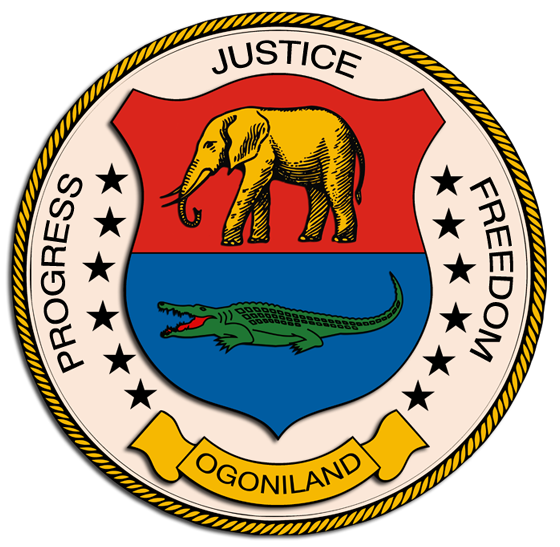
"The Great Seal of
Ogoniland Free State"
The Ogoni Bill of Rights which
was presented to the Government of the Federal Republic of Nigeria in 1990
called for, among other things, political autonomy to participate in the
affairs of the Republic as a distinct and separate unit (by whatever name
called), provided that this autonomy guarantees political control of Ogoni
affairs by Ogoni People; the right to control and use a fair proportion of
Ogoni economic resources for Ogoni development; adequate representations, as
of right, in all Nigerian national institutions, and the right to protect
the Ogoni environment and ecology from further degradation.
OGONI BILL OF
RIGHTS
PRESENTED TO THE
GOVERNMENT OF THE REPUBLIC OF NIGERIA
October, 1990
WITH
AN APPEAL TO THE INTERNATIONAL COMMUNITY
by
The Movement for
the Survival of the Ogoni People
(MOSOP) December, 1991
Published
by Saros International Publishers, 24 Aggrey Road, PO Box 193, Port Harcourt,
Nigeria for
The Movement for the Survival of the Ogoni People (MOSOP)
June 1992
FOREWORD
In
August 1990 the Chiefs and People of Ogoniland, met to sign one of the most
important declarations to come out of Africa in recent times: the Ogoni Bill
of Rights By the Bill, the Ogoni People, while underlining their loyalty to
the Nigerian nation, laid claim as a people to their independence which
British colonialism had first violated and then handed over to some other
Nigerian ethnic groups in October 1960.
The Bill of Rights presented
to the Government and people of Nigeria called for political control of Ogoni
affairs by Ogoni People, control and use of Ogoni economic resources for Ogoni
development, adequate and direct representation as of right for Ogoni People
in all Nigerian national institutions and the right to protect the Ogoni
environment and ecology from further degradation.
These rights which
should have reverted to the Ogoni after the termination of British rule, have
been usurped in the past thirty years by the majority ethnic groups of
Nigeria. They have not only been usurped; they have been misused and abused,
turning Nigeria into a hell on earth for the Ogoni and similar ethnic
minorities. Thirty years of Nigerian independence has done no more than
outline the wretched quality of the leadership of the Nigerian majority
ethnic groups and their cruelty as they have plunged the nation into ethnic
strife, carnage, war, dictatorship, retrogression and the greatest waste of
national resources ever witnessed in world history, turning generations of
Nigerians, born and unborn into perpetual debtors.
The Ogoni Bill of
Rights rejects once and for all this incompetent indigenous colonialism and
calls for a new order in Nigeria, an order in which each ethnic group will
have full responsibility for its own affairs and competition between the
various peoples of Nigeria will be fair, thus ushering in a new era of
peaceful co-existence, co-operation and national progress.
This is
the path which has been chosen by the European tribes in the European
Community, and by the Russians and their neighbours in the new Commonwealth
which they are now fashioning. The Yugoslav tribes are being forced into
similar ways. The lesson is that high fences make good neighbours. The Ogoni
people are therefore in the mainstream of international thought.
It
is well known that since the issuance of the Bill of Rights the Babangida
administration has continued in the reactionary ways of all the military
rulers of Nigeria from Ironsi through Gowon, Obasanjo and Buhari, seeking to
turn Nigeria into a unitary state against the wishes of the Nigerian peoples
and trends in world history. The split of the country into 30 states and 600
local governments in 1991 is a waste of resources, a veritable exercise in
futility. It is a further attempt to transfer the seized resources of the
Ogoni and other minority groups in the delta to the majority ethnic groups
of the country. Without oil, these states and local governments will not
exist for one day longer.
The import of the creation of these states
is that the Ogoni and other minority groups will continue to be slaves of the
majority ethnic groups. It is a gross abuse of human rights, a notable
undemocratic act which flies in the face of modern history. The Ogoni people
are right to reject it. While they are willing, for the reasons of Africa, to
share their resources with other Africans, they insist that it must be on the
principles of mutuality, of fairness, of equity and justice.
It has
been assumed that because the Ogoni are few in number, they can be abused and
denied their rights and that their environment can be destroyed without
compunction. This has been the received wisdom of Nigeria according to
military dictatorships. 1992 will put paid to this as the Ogoni put their
case to the international community.
It is the intention of the Ogoni
people to draw the attention of the American government and people to the
fact that the oil which they buy from Nigeria is stolen property and that it
is against American law to receive stolen goods.
The Ogoni people
will be telling the European Community that their demand of the Yugoslav
tribes that they respect human rights and democracy should also apply to
Nigeria and that they should not wait for Nigeria to burst into ethnic strife
and carnage before enjoining these civilized values on a Nigeria which
depends on European investment, technology and credit.
The Ogoni
people will be appealing to the British Government and the leaders of the
Commonwealth who have urged on Commonwealth countries the virtues of good
government, democracy, human rights and environmental protection that no
government can be good if it imposes and operates laws which cheat a section
of its peoples; that democracy does not exist where laws do not protect
minorities and that the environment of the Ogoni and other delta minorities
has been ruined beyond repair by multi-national oil companies under the
protection of successive Nigerian administrations run by Nigerians of the
majority ethnic groups.
The Ogoni people will make representation to
the World Bank and the International Monetary Fund to the effect that giving
loans and credit to the Nigerian Government on the understanding that oil
money will be used to repay such loans is to encourage the Nigerian
government to continue to dehumanise the Ogoni people and to devastate the
environment and ecology of the Ogoni and other delta minorities among whom
oil is found.
The Ogoni people will inform the United Nations and the
Organisation of African Unity that the Nigerian Constitution and the actions
of the power elite in Nigeria flagrantly violate the UN Declaration of Human
Rights and the African Charter of Human and Peoples Rights; and that Nigeria
in 1992 is no different from Apartheid South Africa. The Ogoni people will
ask that Nigeria be duly chastised by both organizations for its inhuman
actions and uncivilized behaviour. And if Nigeria persists in its perversity,
then it should be expelled form both organizations.
These actions of
the Ogoni people aim at the restoration of the inalienable rights of the
Ogoni people as a distinct ethnic community in Nigeria, and at the
establishment of a democratic Nigeria, a progressive multi-ethnic nation, a
realistic society of equals, a just nation.
What the Ogoni demand for
themselves, namely autonomy, they also ask for others throughout Nigeria and,
indeed, the continent of Africa.
It is their hope that the
international community will respond to these demands as they have done to
similar demands in other parts of the world.
Ken Saro-Wiwa
Port
Harcourt 24/12/91
STATEMENT BY DR. G.B. LETON, OON JP
President of the Movement for the Survival of Ogoni People (MOSOP)
1.
The Ogoni case is of genocide being committed in the dying years of the
twentieth century by multi-national oil companies under the supervision of
the Government of the Federal Republic of Nigeria. It is that of a distinct
ethnic minority in Nigeria who feel so suffocated by existing political,
economic and social conditions in Nigeria that they have no choice but to
cry out to the international community for salvation.
2. The Ogoni
are a distinct ethnic group inhabiting the coastal plains terraces to the
north- east of the Niger delta. On account of the hitherto very rich plateau
soil, the people are mainly subsistence farmers but they also engage in
migrant and nomadic fishing. They occupy an area of about 400 square miles
and number an estimated 500,000. The population density of about 1,250
persons per square mile is among the highest in any rural area in the world
and compares with the Nigerian national average of 300. The obvious problem
is the pressure on land.
3. Petroleum was discovered in Ogoni at Bomu
(Dere) in 1958; since then an estimated US 100 billion dollars worth of oil
has been carted away from Ogoniland. In return for this, the Ogoni have no
pipe-borne water, no electricity, very few roads, ill-equipped schools and
hospitals and no industry whatsoever.
4. Ogoni has suffered and
continues to suffer the degrading effects of oil exploration and
exploitation: lands, streams and creeks are totally and continually polluted;
the atmosphere is for ever charged with hydrocarbons, carbon monoxide and
carbon dioxide; many villages experience the infernal quaking of the wrath of
gas flares which have been burning 24 hours a day for 33 years; acid rain,
oil spillages and blowouts are common. The result of such unchecked
environmental pollution and degradation are that (i) The Ogoni can no longer
farm successfully. Once the food basket of the eastern Niger Delta, the Ogoni
now buy food (when they can afford it); (ii) Fish, once a common source of
protein, is now rare. Owing to the constant and continual pollution of our
streams and creeks, fish can only be caught in deeper and offshore waters for
which the Ogoni are not equipped. (iii) All wildlife is dead. (iv) The
ecology is changing fast. The mangrove tree, the aerial roots of which
normally provide a natural and welcome habitat for many a sea food - crabs,
periwinkles, mudskippers, cockles, mussels, shrimps and all - is now being
gradually replaced by unknown and otherwise useless plams. (v) The health
hazards generated by an atmosphere charged with hydrocarbon vapour, carbon
monoxide and carbon dioxide are innumerable.
5. The once beautiful
Ogoni countryside is no more a source of fresh air and green vegetation. All
one sees and feels around is death. Death is everywhere in Ogoni. Ogoni
languages are dying; Ogoni culture is dying; Ogoni people, Ogoni animals,
Ogoni fishes are dying because of 33 years of hazardous environmental
pollution and resulting food scarcity. In spite of an alarming density of
population, American and British oil companies greedily encroach on more and
more Ogoni land, depriving the peasants of their only means of livelihood.
Mining rents and royalties for Ogoni oil are seized by the Federal Government
of Nigeria which offers the Ogoni people NOTHING in return. Ogoni is being
killed so that Nigeria can live.
6. Politically, the Ogoni are being
ground to the dust under dictatorial decrees imposed by successive military
regimes in Nigeria and laws smuggled by military dictatorships into the
Nigerian Constitution which Constitution does not protect ethnic minorities
and which today bears no resemblance whatsoever to the covenant entered into
by the federating Nigerian ethnic groups at Independence.
7.
Ethnicity is a fact of Nigerian life. Nigeria is a federation of ethnic
groups. In practice, however, ethnocentrism is the order of the day in the
country. The rights and resources of the Ogoni have been usurped by the
majority ethnic groups and the Ogoni consigned to slavery and possible
extinction. The Ogoni people reject the current political and administrative
structuring of Nigeria imposed by the Military Government. They believe with
Obafemi Awolowo that in a true federation, each ethnic gourp, no matter how
small is entitled to the same treatment as any other ethnic group, no matter
how large.
8. The Ogoni people therefore demand POLITICAL AUTONOMY as
a distinct and separate unit of the Nigerian federation - autonomy which will
guarantee them certain basic rights essential to their survival as a people.
This demand has been spelt out in the Ogoni Bill of Rights. The Ogoni people
stand by the Bill and now appeal to the international community, as a last
resort, to save them from extinction.
(Sgd) Dr. G.B. Leton
President, Movement for the Survival of Ogoni People
(MOSOP)
OGONI BILL OF RIGHTS PRESENTED TO THE GOVERNMENT AND
PEOPLE OF NIGERIA
We, the people of Ogoni (Babbe, Gokana, Ken
Khana, Nyo Khana and Tai) numbering about 500,000 being a separate and
distinct ethnic nationality within the Federal Republic of Nigeria, wish to
draw the attention of the Governments and people of Nigeria to the
undermentioned facts:
1. That the Ogoni people, before the advent of
British colonialism, were not conquered or colonized by any other ethnic
group in present-day Nigeria.
2. That British colonization forced us
into the administrative division of Opobo from 1908 to 1947.
3. That
we protested against this forced union until the Ogoni Native Authority was
created in 1947 and placed under the then Rivers Province.
4. That in
1951 we were forcibly included in the Eastern Region of Nigeria where we
suffered utter neglect.
5. That we protested against this neglect by
voting against the party in power in the Region in 1957, and against the
forced union by testimony before the Willink Commission of Inquiry into
Minority Fears in 1958.
6. That this protest led to the inclusion of
our nationality in Rivers State in 1967, which State consists of several
ethnic nationalities with differing cultures, languages and
aspirations.
7. That oil was struck and produced in commercial
quantities on our land in 1958 at K. Dere (Bomu oilfield).
8. That
oil has been mined on our land since 1958 to this day from the following
oilfields: (i) Bomu (ii) Bodo West (iii) Tai (iv) Korokoro (v) Yorla (vi)
Lubara Creek and (vii) Afam by Shell Petroleum Development Company (Nigeria)
Limited.
9. That in over 30 years of oil mining, the Ogoni nationality
have provided the Nigerian nation with a total revenue estimated at over 40
billion Naira (N40 billion) or 30 billion dollars.
10. That in return
for the above contribution, the Ogoni people have received NOTHING.
11. That today, the Ogoni people have:
(i) No representation
whatsoever in ALL institutions of the Federal Government of Nigeria.
(ii) No pipe-borne water.
(iii) No electricity.
(iv) No job
opportunities for the citizens in Federal, State, public sector or private
sector companies.
(v) No social or economic project of the Federal
Government.
12. That the Ogoni languages of Gokana and Khana are
underdeveloped and are about to disappear, whereas other Nigerian languages
are being forced on us.
13. That the Ethnic policies of successive
Federal and State Governments are gradually pushing the Ogoni people to
slavery and possible extinction.
14. That the Shell Petroleum
Development Company of Nigeria Limited does not employ Ogoni people at a
meaningful or any level at all, in defiance of the Federal government s
regulations.
15. That the search for oil has caused severe land and
food shortages in Ogoni one of the most densely populated areas of Africa
(average: 1,500 per square mile; national average: 300 per square
mile).
16. That neglectful environmental pollution laws and
substandard inspection techniques of the Federal authorities have led to the
complete degradation of the Ogoni environment, turning our homeland into an
ecological disaster.
17. That the Ogoni people lack education, health
and other social facilities.
18. That it is intolerable that one of
the richest areas of Nigeria should wallow in abject poverty and
destitution.
19. That successive Federal administrations have trampled
on every minority right enshrined in the Nigerian Constitution to the
detriment of the Ogoni and have by administrative structuring and other
noxious acts transferred Ogoni wealth exclusively to other parts of the
Republic.
20. That the Ogoni people wish to manage their own
affairs.
NOW, therefore, while reaffirming our wish to remain a part
of the Federal Republic of Nigeria, we make demand upon the Republic as
follows:
That the Ogoni people be granted POLITICAL AUTONOMY to
participate in the affairs of the Republic as a distinct and separate unit by
whatever name called, provided that this Autonomy guarantees the
following:
(i) Political control of Ogoni affairs by Ogoni
people.
(ii) The right to the control and use of a fair proportion of
OGONI economic resources for Ogoni development.
(iii) Adequate and
direct representation as of right in all Nigerian national
institutions.
(iv) The use and development of Ogoni languages in all
Nigerian territory.
(v) The full development of Ogoni culture.
(vi) The right to religious freedom.
(vii) The right to protect the
OGONI environment and ecology from further degradation.
We make the
above demand in the knowledge that it does not deny any other ethnic group in
the Nigerian Federation of their rights and that it can only conduce to
peace, justice and fairplay and hence stability and progress in the Nigerian
nation.
We make the demand in the belief that, as Obafemi Awolowo has
written: In a true federation, each ethnic group no matter how small, is
entitled to the same treatment as any other ethnic group, no matter how
large.
We demand these rights as equal members of the Nigerian
Federation who contribute and have contributed to the growth of the
Federation and have a right to expect full returns from that
Federation.
Adopted by general acclaim of the Ogoni people on the 26th
day of August, 1990 at Bori, Rivers State and signed by: (see
under).
ADDENDUM TO THE OGONI BILL OF RIGHTS
We,
the people of Ogoni, being a separate and distinct ethnic nationality within
the Federal Republic of Nigeria, hereby state as follows:
(a) That on
October 2, 1990 we addressed an Ogoni Bill of Rights to the President of the
Federal Republic of Nigeria, General Ibrahim Babangida and members of the
Armed Forces Ruling Council;
(b) That after a one-year wait, the
President has been unable to grant us the audience which we sought to have
with him in order to discuss the legitimate demands contained in the Ogoni
Bill of Rights;
(c) That our demands as outlined in the Ogoni Bill of
Rights are legitimate, just and our inalienable right and in accord with
civilized values worldwide;
(d) That the Government of the Federal
Republic has continued, since October 2, 1990, to decree measures and
implement policies which further marginalize the Ogoni people, denying us
political autonomy, our rights to our resources, to the development of our
languages and culture, to adequate representation as of right in all Nigerian
national institutions and to the protection of our environment and ecology
from further degradation;
(e) That we cannot sit idly by while we are,
as a people, dehumanized and slowly exterminated and driven to extinction
even as our rich resources are siphoned off to the exclusive comfort and
improvement of other Nigerian communities, and the shareholders of
multi-national oil companies.
Now therefore, while re-affirming our
wish to remain a part of the Federal Republic of Nigeria, we hereby authorize
the Movement for the Survival of Ogoni People (MOSOP) to make representation,
for as long as these injustices continue, to the United Nations Commission on
Human Rights, the Commonwealth Secretariat, the African Commission on Human
and Peoples rights, the European Community and all international bodies which
have a role to play in the preservation of our nationality, as
follows:
1. That the Government of the Federal Republic of Nigeria
has, in utter disregard and contempt for human rights, since independence in
1960 till date, denied us our political rights to self-determination,
economic rights to our resources, cultural rights to the development of our
languages and culture, and social rights to education, health and adequate
housing and to representation as of right in national institutions;
2. That, in particular, the Federal Republic of Nigeria has refused to pay
us oil royalties and mining rents amounting to an estimated 20 billion US
dollars for petroleum mined from our soil for over thirty-three
years;
3. That the Constitution of the Federal Republic of Nigeria
does not protect any of our rights whatsoever as an ethnic minority of
500,000 in a nation of about 100 million people and that the voting power and
military might of the majority ethnic groups have been used remorselessly
against us at every point in time;
4. That multi-national oil
companies, namely Shell (Dutch/British) and Chevron (American) have severally
and jointly devastated our environment and ecology, having flared gas in our
villages for 33 years and caused oil spillages, blow-outs etc., and have
dehumanised our people, denying them employment and those benefits which
industrial organizations in Europe and America routinely contribute to their
areas of operation;
5. That the Nigerian elite (bureaucratic,
military, industrial and academic) have turned a blind eye and a deaf ear to
these acts of dehumanisation by the ethnic majority and have colluded with
all the agents of destruction aimed at us;
6. That we cannot seek
restitution in the courts of law in Nigeria as the act of expropriation of
our rights and resources has been institutionalised in the 1979 and 1989
Constitutions of the Federal Republic of Nigeria, which Constitutions were
acts of a Constituent Assembly imposed by a military regime and do not , in
any way, protect minority rights or bear resemblance to the tacit agreement
made at Nigerian independence.
7. That the Ogoni people abjure
violence in their just struggle for their rights within the Federal Republic
of Nigeria but will, through every lawful means, and for as long as is
necessary, fight for social justice and equity for themselves and their
progeny, and in particular demand political autonomy as a distinct and
separate unit within the Nigerian nation with full right to (i) control Ogoni
political affairs, (ii) use at least fifty per cent of Ogoni economic
resources for Ogoni development; (iii) protect the Ogoni environment and
ecology from further degradation; (iv) ensure the full restitution of the
harm done to the health of our people by the flaring of gas, oil spillages,
oil blow- outs, etc. by the following oil companies: Shell, Chevron and their
Nigerian accomplices.
8. That without the intervention of the
international community the Government of the Federal Republic of Nigeria and
the ethnic majority will continue these noxious policies until the Ogoni
people are obliterated from the face of the earth.
Adopted by general
acclaim of the Ogoni people on the 26th day of August 1991 at Bori, Rivers
State of Nigeria.
Signed on behalf of the Ogoni people by:
BABBE:
HRH Mark Tsaro-Igbara, Gbenemene Babbe; HRH F.M.K. Noryaa,
Menebua, Ka-Babbe; Chief M.A.M. Tornwe III, JP; Prince J.S. Sangha; Dr.
Israel Kue; Chief A.M.N. Gua.
GOKANA:
HRH James P. Bagia,
Gberesako XI, Gberemene Gokana; Chief E.N. Kobani, JP Tonsimene Gokana; Dr.
B.N. Birabi; Chief Kemte Giadom, JP; Chief S.N. Orage.
KEN-KHANA:
HRH M.H.S. Eguru, Gbenemene Ken-Khana; HRH C.B.S. Nwikina,
Emah III, Menebua Bom; Mr. M.C. Daanwii; Chief T.N. Nwieke; Mr. Ken
Saro-wiwa; Mr. Simeon Idemyor.
NYO-KHANA:
HRH W.Z.P. Nzidee,
Genemene Baa I of Nyo-Khana; Dr. G.B. Leton, OON, JP; Mr. Lekue Lah-Loolo;
Mr. L.E. Mwara; Chief E.A. Apenu; Pastor M.P. Maeba. TAI: HRH B.A. Mballey,
Gbenemene Tai; HRH G.N. Gininwa, Menebua Tua Tua; Chief J.S. Agbara; Chief
D.J.K. Kumbe; Chief Fred Gwezia; HRH A. Demor-Kanni, Meneba
Nonwa.
THE INTERNATIONAL COMMUNITY SHOULD:
1.
Prevail on the American Government to stop buying Nigerian oil. It is stolen
property.
2. Prevail on Shell and Chevron to stop flaring gas in
Ogoni.
3. Prevail on the Federal Government of Nigeria to honour the
rights of the Ogoni people to self-determination and AUTONOMY.
4.
Prevail on the Federal Government of Nigeria to pay all royalties and mining
rents collected on oil mined from Ogoni since 1958.
5. Prevail on the
World Bank and the International Monetary Fund to stop giving loans to the
Federal Government of Nigeria; all loans which depend for their repayment on
the exploitation of Ogoni oil resources.
6. Send urgent medical and
other aid to the Ogoni people.
7. Prevail on the United Nations, the
Organisation of African Unity and the Commonwealth of Nations to either get
the Federal Government of Nigeria to obey the rules and mores of these
organisations, face sanctions or be expelled from them.
8. Prevail on
European and American Governments to stop giving aid and credit to the
Federal Government of Nigeria as aid and credit only go to encourage the
further dehumanisation of the Ogoni people.
9. Prevail on European and
American Governments to grant political refugee status to all Ogoni people
seeking protection from the political persecution and genocide at the hands
of the Federal Government of Nigeria.
10. Prevail on Shell and Chevron
to pay compensation to the Ogoni People for ruining the Ogoni environment and
the health of Ogoni men, women and children.
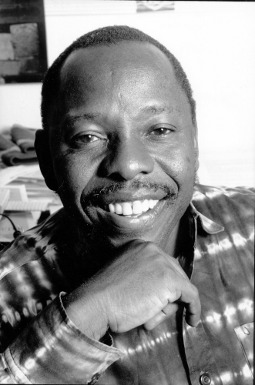
Ken
Saro-Wiwa
Kenule
"Ken" Beeson Saro Wiwa (10 October 1941 – 10 November 1995) was a Ogoni
writer, television producer, environmental activist, and winner of the Right
Livelihood Award and the Goldman Environmental Prize.
Saro-Wiwa was
a member of the Ogoni People, whose homeland, Ogoniland, in the Niger Delta
has been targeted for crude oil extraction since the 1950s and which has
suffered extreme environmental damage from decades of indiscriminate
petroleum waste dumping.
Initially as spokesperson, and then as
President, of the Movement for the Survival of the Ogoni People (MOSOP),
Saro-Wiwa led a nonviolent campaign against environmental degradation of the
land and waters of Ogoniland by the operations of the multinational petroleum
industry, especially the Royal Dutch Shell company. He was also an outspoken
critic of the Nigerian government, which he viewed as reluctant to enforce
environmental regulations on the foreign petroleum companies operating in the
area.
At the peak of his non-violent campaign, Saro-Wiwa was arrested,
hastily tried by a special military tribunal, and hanged in 1995 by the
Military Regime of General Sani Abacha, all on charges widely viewed as
entirely politically motivated and completely unfounded. His execution
provoked international outrage and resulted in Nigeria's suspension from the
Commonwealth of Nations for over three years.
CONCERNING NIGERIA AND
THE FUTURE
Nigeria itself is proving by all objective world-studies and reports that it
is a Failed State, in the state of continued fall; and even if we did
nothing, it will self-destruct in a matter of time (which the US Intelligent
predicts will happen in 2015). Terrorism and ethnic cleansing, done with
impunity by Boko Haram is the example-of-the-day why Nigeria cannot and will
not stand. Ogoniland is our inevitable destiny.
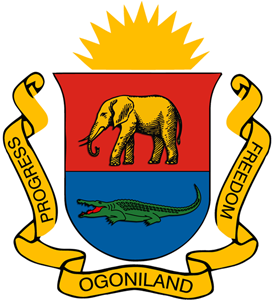
Ogoniland Free State
CONTACT US
E-mail: [email protected]
Copyright © 2012 Ogoniland.info All
rights reserved

